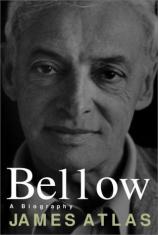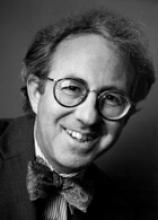Excerpt
Excerpt
Bellow: A Biography

I was, in 1937, a very young, married man who had quickly lost his first job and who lived with his in-laws. His affectionate, loyal, and pretty wife insisted that he must be given a chance to write something."
But what? In "Starting Out in Chicago," originally delivered as a Brandeis commencement address in 1974, Saul Bellow provided a memorable portrait of his beginnings as a writer. If the year is wrong--it was 1938, just a year before the outbreak of World War II in Europe--the details are painfully accurate. This brief memoir, more than anything else he ever wrote, captures the early stage of that momentous confrontation in which "American society and S. Bellow came face to face." He was twenty-two years old.
The job he'd lost was a stint in his older brother Maurice's coalyard, and he was fired for absenteeism. Maurice, not unreasonably, expected his brother to keep regular hours; Bellow had other ideas about how to spend his time: He wanted to write.
His in-laws' apartment on North Virginia Avenue in the Northwest Side neighborhood of Ravenswood was drab and anonymous, one of the thousands of identical brick dwellings that sprawled mile upon mile across a dull, orderly grid of streets. While his wife, Anita, attended classes at the School of Social Service Administration at the university, Bellow sat at a bridge table in the back bedroom:
My table faced three cement steps that rose from the cellar into the brick gloom of a passageway. Only my mother-in-law was at home. A widow, then in her seventies [actually, her mid-sixties], she wore a heavy white braid down her back. She had been a modern woman and a socialist and suffragette in the old country. She was attractive in a fragile, steely way. You felt Sophie's [Sonya's] strength of will in all things. She kept a neat house. The very plants, the ashtrays, the pedestals, the doilies, the chairs, revealed her mastery. Each object had its military place. Her apartment could easily have been transferred to West Point.
Lunch occurred at half past twelve. The cooking was good. We ate together in the kitchen. The meal was followed by an interval of stone. My mother-in-law took a nap. I went into the street. Ravenswood was utterly empty. I walked about with something like a large stone in my belly. I often turned into Lawrence Avenue and stood on the bridge looking into the drainage canal. If I had been a dog I would have howled.
American writers are largely self-made. William Faulkner emerged out of the somnolent town of Oxford, Mississippi; Ernest Hemingway was brought up in the bland suburb of Oak Park, just a few miles from Ravenswood; Sinclair Lewis hailed from Sauk Centre, Minnesota. They simply "materialized somehow," as Bellow put it. But even by the folkloric standards of American literature, Bellow's remoteness from the centers of culture was extreme. "Bernanos, the French religious novelist, said that his soul could not bear to be cut off from its kind, and that was why he did his work in cafés," Bellow noted enviously: "Cafés indeed! I would have kissed the floor of a café. There were no cafés in Chicago. There were greasy-spoon cafeterias, one-arm joints, taverns. I never yet heard of a writer who broughthis manuscripts into a tavern."
Over the years, he collected a virtual anthology of disparaging observations that visitors had made about the city: Oscar Wilde found the Water Tower, one of the few buildings to survive the great Chicago fire of 1871, an offense against good taste; "he was amazed that people could so abuse Gothic art." Rudyard Kipling was appalled by the Palmer House, "a gilded and mirrored rabbit-warren crammed with people talking about money and spitting about everywhere." Edmund Wilson was oppressed by the canyons of La Salle Street: "In the morning, the winter sun does not seem to give any light: it leaves the streets dull. It is more like a forge which has just been started up, and is beginning to burn red in an atmosphere darkened by coal-fumes."
It would have been hard to deny the truth of what they saw: Culture in Chicago was a marginal enterprise. Dominated by the brute forces of industry, by stockyards and farm-machinery works and automobile assembly lines, it was the city, in Sandburg's famous line, of "big shoulders." Yet it was also true that Chicago possessed an indigenous literature. In the decades just before and after 1900, novels by Chicago writers crowded the shelves: Frank Norris's The Pit (1903), about wheat speculators on the floor of the Chicago Board of Trade; Willa Cather's The Song of the Lark (1915), about a young lady from Nebraska who came to study music in the city; Upton Sinclair's The Jungle (1906), a raw depiction of the harsh existence of a Lithuanian immigrant family in the South Side stockyards; Theodore Dreiser's Frank Cowperwood trilogy, based on the career of Charles T. Yerkes, the Chicago railroad financier; the works of Sherwood Anderson. The Chicago Renaissance was a fact. "Find a writer who is indubitably an American in every pulse-beat, snort and adenoid, an American who has something new and peculiarly American to say and who says it in an unmistakable American way," H. L. Mencken declared, "and nine times out of ten you will find that he has some sort of connection with the gargantuan and inordinate abattoir by Lake Michigan."
What nineteenth-century Paris had been to Lucien de Rubempré, the hero of Balzac's Lost Illusions, twentieth-century Chicago was to young men and women from Terre Haute or Valparaiso: "the place," wrote Bellow, "the incredible, vital, sinful, fascinating big city." If there were no cafés, there was still a tremendous concentration of vivid private experience--evidence, Bellow contended in his memoir, "that the life lived in great manufacturing, shipping, and banking centers, with their slaughter stink, their great slums, prisons, hospitals, and schools, was also a human life." Milton Friedman, who brought honor to the university by winning a Nobel Prize in economics in 1976 (the same year that Bellow won in literature), has speculated that the city's reputation for nurturing literary and intellectual talent can be traced to the same geographical centrality that made it a great industrial power. Chicago, Friedman noted, was "a new, raw city bursting with energy, far less sophisticated than New York, but for that very reason far more tolerant of diversity, of heterodox ideas." New York looked east, to the Old World. Chicago looked west, to the frontier--in effect, inventing its own frontiers.
This energy was the catalyst of Bellow's art. In his hands, the city would become a character in its own right, the center of both his life and his work. The shelf of books he produced over the course of a career sustained for more than half a century was to make "Bellow's Chicago" as familiar a locale in literature as Joyce's Dublin. It wasn't an achievement that his circumstances preordained; the absence of encouragement, of community, of any plausible way to make a living would have provoked a person far sturdier than Bellow to despair. But he was armored against disappointment by a stubborn belief in his destiny--a belief he maintained in the absence of both proof and reason. The sociologist Edward Shils, for many years his colleague at the University of Chicago and one of the most incisive interpreters of his character, noted, "For Bellow, an artist was the same as being a saint, an 'unacknowledged legislator of mankind,' one who was consecrated to the highest function of which any human being is capable, namely, to be an artist." It was a belief that enabled him to prevail.
Excerpted from BELLOW © Copyright 2000 by James Atlas. Reprinted by permission of Random House, Inc. All rights reserved
Bellow: A Biography
- Genres: Biography, Nonfiction
- hardcover: 688 pages
- Publisher: Random House
- ISBN-10: 0394585011
- ISBN-13: 9780394585017



